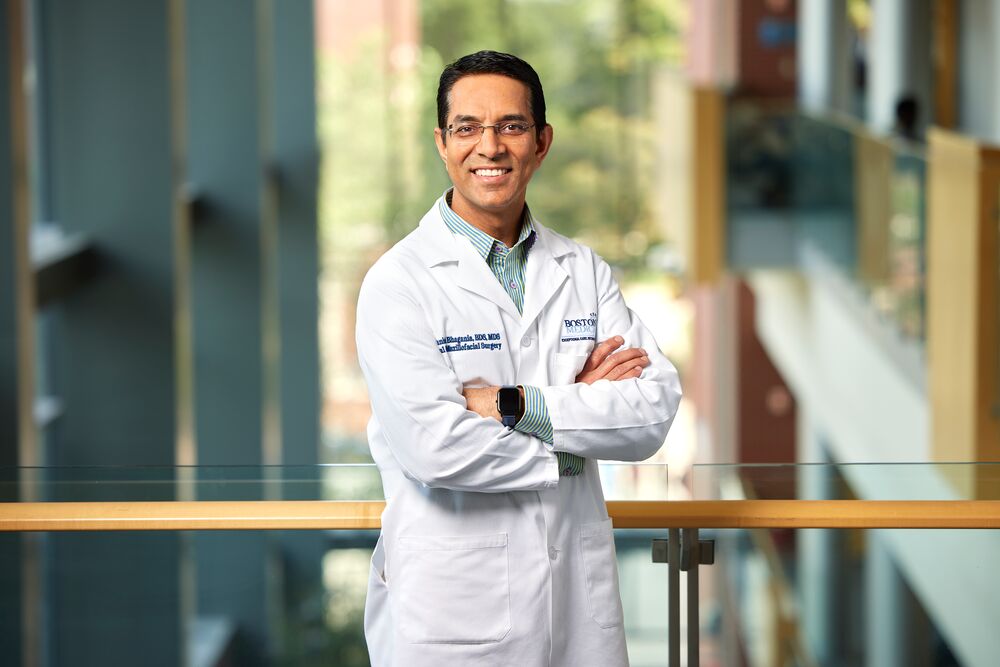Clinical Associate Professor and International Scholar Strives to Advance Dental Education and Bring a Global Perspective
Dr. Manish Bhagania’s commitment to his students and patients runs deep

For Dr. Manish Bhagania, Clinical Associate Professor at Boston University’s Henry M. Goldman School of Dental Medicine, every student interaction, research question, and patient encounter is an opportunity to push the boundaries of oral and maxillofacial surgery — and to make a meaningful impact that extends far beyond BU.
Recently, Dr. Bhagania reflected on his professional journey from India to the U.S., his dedication to advancing dental education, and his vision for the future of oral surgery. In his multifaceted role — teaching, clinical training, and research — he continues to model the blend of excellence, empathy, and innovation that defines his approach.
Addressing Gaps in Dental Education
On the teaching side, Dr. Bhagania is leading multiple survey-based research to identify gaps in dental curricula and improve how clinical and professional skills are taught.
“We’re trying to understand where students struggle and how we can better prepare them to become confident, capable dental professionals,” he explains.
One area of focus is the coding and billing system used in medical and dental practice — a critical yet often overlooked component of education. “Many dental graduates are unaware of the complexities of coding and billing,” he says. “Someone who understands this system can ensure accurate reimbursement and financial sustainability, while poor coding can lead to significant losses — even up to a million dollars.”
His study, with response rates of 70–78%, seeks to uncover ways to better integrate this training into existing curricula. “The goal,” he adds, “is not to add more to an already heavy curriculum, but to weave coding awareness naturally into courses — for instance, by discussing relevant codes alongside clinical topics so students connect both aspects intuitively.”
Embracing Technology and Change
Beyond education, Dr. Bhagania is equally focused on embracing new technologies that enhance both learning and patient outcomes. He points to the growing role of AI and guided robotics in oral surgery.
“We now have robotic and guided systems that help us place dental implants more precisely, with fewer errors and complications,” he explains. “That means better outcomes and less morbidity for patients.”
Similarly, advances in imaging technology have transformed preoperative planning. “With CT scans, we can identify complex anatomy — for example, the positioning of wisdom teeth — before surgery. This helps us adjust treatment plans and prevent complications both during and after surgery.”
Advocating for Inclusivity in Dental Education
In addition to his work at BU, Dr. Bhagania serves as the Chair of the ADEA Section on Addiction Education, where he advocates for an inclusive, non-stigmatizing approach to teaching and addressing substance use in dentistry. Under his leadership, the section emphasizes the importance of preparing future dentists to care for patients with empathy, awareness, and evidence-based understanding. “Substance use impacts every community,” he notes. “Our responsibility as educators is to ensure students learn to approach these conversations without judgment, and with a focus on supporting patient health and dignity.” He recently led a three-part webinar series titled “Cannabis Use and Dentistry” that was attended by educators and providers across the country.
A Global Perspective on Mental Health
Dr. Bhagania values BU’s collaborative, interdisciplinary environment — one that encourages innovation while nurturing human connection.
“One of the things that keeps me motivated,” he says, “is the belief that I can always do more. And in teaching, I love knowing that when our students graduate, they take a little part of us — our guidance, our example — into their own careers and communities.”
Outside the classroom and clinic, Dr. Bhagania maintains balance through sports like squash and badminton, emphasizing the importance of wellness for both students and professionals.
“I tell my students it’s not just about study or patient care all the time,” he says. “You have to think about your own wellness too.”
This belief has inspired his global study on mental health awareness among oral and maxillofacial surgeons, exploring coping strategies and stress management within a demanding profession.
With a career that bridges continents and disciplines, Dr. Bhagania continues to bring a global perspective, innovative mindset, and deep compassion to everything he does. His work at BU — and beyond — stands as a testament to his belief that growth, care, and curiosity can transform both individuals and the field of dentistry.